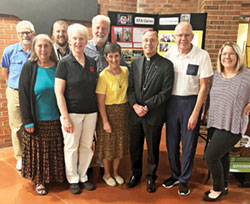Archdiocese is one of 10 in the U.S. to submit Laudato Si’ Action Platform plan

Members of the archdiocese’s Creation Care Ministry pose with Archbishop Charles C. Thompson at St. Thomas Aquinas Parish in Indianapolis on Sept. 26, the day the archbishop celebrated the archdiocese’s annual Green Mass there. Posing in the front row are Rosemary Spalding, left, Sharon Horvath, Benedictine Sister Sheila Fitzpatrick, Archbishop Charles C. Thompson, Joe Shierling and Laura Sheehan. In the back row are Andy Pike, left, Andy Miller and John Mundell. Creation Care Ministry members not in the photo are Sarah Mundell and Julie Reyes. (Submitted photo)
By Natalie Hoefer
This year’s archdiocesan Green Mass on Sept. 26 did more than honor the Church’s Season of Care for Creation.
At the end of the Mass celebrated by Archbishop Charles C. Thompson, he announced the archdiocese’s submission of its plan to the Vatican’s Laudato Si’ Action Platform (LSAP)—one of only 10 dioceses in the U.S. to do so thus far.
“The need to recover a right relationship with God, especially in terms of humanity’s negligence and abuse of creation, necessarily involves healing and reconciliation,” he said in his homily during the Mass, which was celebrated at St. Thomas Aquinas Church in Indianapolis.
“The Laudato Si’ Action Platform, [for] which our own John Mundell serves as director, provides opportunity for such healing and reconciliation by enabling institutions, communities, families and individuals to develop action plans for achieving concrete goals toward a more holistic relationship with creation.” (Related story: Director of global Laudato Si’ Action Platform reflects on ‘Laudate Deum’)
Seven goal areas
Mundell, who is a member of Our Lady of Lourdes Parish in Indianapolis, serves as the global director of the LSAP—an effort of the Vatican’s Dicastery for Promoting Integral Human Development. Mundell, president and senior environmental consultant for Mundell & Associates, Inc., in Indianapolis, is also a member of the archdiocese’s Creation Care Ministry.
“Our archdiocese is one of only 10 out of 196 dioceses in the U.S. to publish [on the LSAP site] our plan to become more sustainable,” Mundell said. “Our Creation Care Ministry [team] worked hard to make that happen. It’s available to all dioceses in the world.”
The LSAP allows seven categories of groups—including individuals, entities and dioceses—around the world to publish personal or institutional actions to care for creation by living more sustainably.
The archdiocese’s plan revolves around seven goal areas: an increased response to the cry of the Earth; an increased response to the cry of the poor; development of ecological economics; adoption of sustainable lifestyles; enhancement of ecological education; encouragement of ecological spirituality; and growth in community engagement and participatory action.
‘Ambitious first yearly plan’
The submission to the LSAP “was our ambitious first yearly plan that combined some actions we had already completed last year, some this year, and some are future-looking actions still to work on,” said John’s daughter Sarah Mundell, director of communications and community engagement for Mundell & Associates. She is also a member of the archdiocese’s Creation Care Ministry, and LSAP communications lead.
Part of the plan involves more parish and Catholic school participation in an energy audit pilot program.
“We had already done sustainability site visits for four parishes and a Catholic high school before this summer,” said Sarah, a member of St. Therese of the Infant Jesus (Little Flower) Parish in Indianapolis. “This summer, we engaged with 11 parishes that expressed interest in sustainability site visits. Of those, eight followed up with visits.”
Much of the plan includes the Creation Care Ministry team’s efforts in serving as a resource and source of education for parishes, Catholic schools and archdiocesan offices in their efforts to function more sustainably.
A major part of that effort is done through “maintaining and improving” the ministry’s website, ourcommonhome.org, said Sarah, “which we’ve already been doing for the last five years.”
Sarah said other completed, ongoing and future actions include establishing an independent archdiocesan Creation Care fund and grant process for sustainability projects; encouraging the establishment of parish/school “shared resources programs” as an approach to wants and needs versus purchasing of new items; and working with the Indiana Catholic Conference in lobbying for legislation “that reflects Catholic values in the state of Indiana” and monitoring statewide environmental issues.
“We will update this plan in January 2024 for the upcoming year,” Sarah noted. “Moving forward, we imagine building an accumulative list under each goal for what are current projects and what are completed projects in each goal.”
‘Set aside egos, agendas and ideologies’
Caring for creation takes the effort of all people as part of their “interwoven relationships with God, neighbor, creation and self [that] determine the fabric in one’s spirituality of human existence,” Archbishop Thompson noted in his homily during the Green Mass—another initiative of the Creation Care Ministry.
“As we pray and discern how best to better respect the dignity of the human person, serve the poor and safeguard the planet, let us set aside egos, agendas and ideologies that we might be more Christ-centered in our efforts of accompaniment, dialogue, encounter and reconciliation.”
(For more information, go to ourcommonhome.org. Parishes interested in monitoring their energy use through the Energy Star Portfolio Manager should
send an e-mail to mail@ourcommonhome.org.) †
